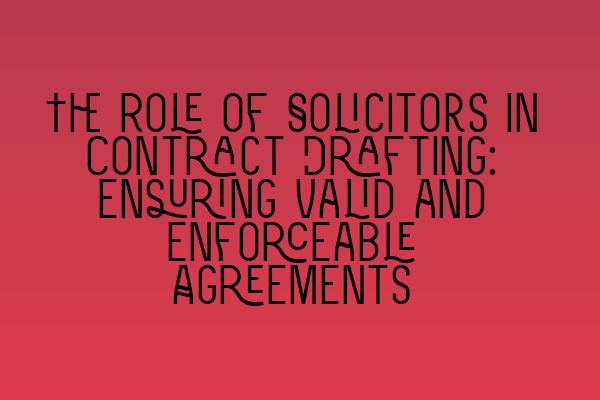The Role of Solicitors in Contract Drafting: Ensuring Valid and Enforceable Agreements
In the world of business, contracts are the lifeblood that keeps transactions flowing smoothly. Whether it’s a simple agreement between two parties or a complex commercial contract, having a well-drafted and legally sound document is crucial. This is where solicitors play a pivotal role. In this article, we will explore the importance of solicitors in contract drafting and how they ensure that agreements are valid and enforceable.
Before we delve into the role of solicitors, let’s first understand the significance of a valid and enforceable contract. A valid contract is one that meets all the essential elements required by law, such as offer, acceptance, consideration, and intention to create legal relations. On the other hand, an enforceable contract means that if one party fails to fulfill the obligations outlined in the agreement, the other party can seek legal remedies.
Solicitors are legal professionals who specialize in various areas of law, including contract law. They possess the knowledge, expertise, and experience to navigate the complexities of drafting contracts. Their role in contract drafting is crucial as they ensure that agreements comply with legal requirements and protect the interests of their clients.
One of the primary responsibilities of a solicitor in contract drafting is to ensure clarity and precision in the language used. Contracts can sometimes be laden with complex legal jargon and terminology that may be difficult for the parties involved to understand. A skilled solicitor will simplify the language and structure of the contract, making it accessible and comprehensible to all parties involved. This not only reduces the risk of misunderstandings but also enhances transparency and facilitates smooth negotiations.
In addition to clarity, solicitors also ensure that the contract covers all necessary provisions. This includes defining the rights and responsibilities of each party, specifying the term of the agreement, outlining the scope of work, setting payment terms, and addressing potential disputes or limitations. By drafting a comprehensive contract, solicitors help minimize ambiguity and the likelihood of disputes arising in the future.
Furthermore, solicitors play a vital role in ensuring that contracts are compliant with the relevant laws and regulations. They stay updated with the latest legal developments and incorporate the necessary clauses and provisions to ensure compliance. This is particularly important in industries with specific regulatory requirements, such as healthcare, finance, and construction. By ensuring compliance, solicitors protect their clients from potential legal consequences and help maintain their reputation and credibility.
Solicitors also contribute to the negotiation process between the parties involved in a contract. They not only represent their clients’ interests but also act as mediators and facilitators, ensuring that the negotiations progress smoothly. Their expertise in contract law enables them to identify potential pitfalls or loopholes that may arise during the negotiation process and offer suitable legal solutions.
In conclusion, the role of solicitors in contract drafting is paramount in ensuring that agreements are valid and enforceable. From simplifying complicated legal language to ensuring compliance with laws and regulations, solicitors play a pivotal role in the creation of legally sound contracts. By leveraging their expertise, solicitors protect their clients’ interests, minimize the risk of disputes, and contribute to the smooth functioning of business transactions.
If you found this article informative, you may be interested in exploring the impact of frustration on contractual obligations in our related article: Exploring the Impact of Frustration on Contractual Obligations: Legal Insights. Additionally, understanding contractual clauses is crucial, and you can learn more about it here: Interpreting Contractual Clauses: Unlocking the Hidden Meanings. For entrepreneurs, knowing about the key considerations in business contracts is essential, and you can find more information in our related article: Legal Aspects of Business Contracts: Key Considerations for Entrepreneurs. If you want to dive deeper into the various types of agreements in contract law, check out: Agreements in Contract Law: Understanding Its Various Types. Lastly, understanding the basics of consideration is crucial, and you can find more insights in our related article: Essentials of Consideration: Understanding the Basis of Contractual Exchange.
